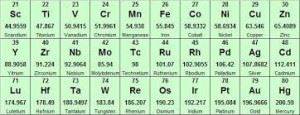Joint Entrance Examination (JEE) is a common entrance examination conducted by CBSE Board for admissions to various engineering colleges in India. Every student appearing for this examination aspires to score his best and join one of the prestigious universities in India. Chemistry is one of the most scoring subjects to enhance your rank in the JEE exam. Questions from chemistry are relatively lesser time taking in comparison to maths and physics. On the basis of JEE syllabus chemistry is broadly divided into three categories: organic chemistry, inorganic chemistry and physical chemistry. Of all the topics in inorganic chemistry, transition elements are one of the most important topics to cover. Some FAQ’s related to transition elements are explained below:

Important Questions For Transition Elements
1. What are some of the important topics to cover in transition elements?
Transition elements are basically the elements belonging to the d and f group of the modern periodic table. If we go through the previous year JEE question papers we find almost every year at least two to three questions are asked from this chapter. The concepts pertaining to transition elements are more important as they lay the foundation for further topics that are introduced in coordination compounds. Main concepts involved in this chapter are the colouration of transition elements, multiple oxidation states, trends in their ionisation potential, ionic radii both down the group and across the period, magnetic properties etc. According to JEE syllabus for chemistry, the reactions of potassium permanganate and potassium dichromate are very important and also their preparation techniques.
2. Which reference books can one follow for transition elements”?
While covering “transition elements” for JEE chemistry, one must go through the NCERT class 12th chemistry textbook part-1. A brisk walk through this chapter from NCERT gives you a sound idea of the various topics you need to cover for JEE and also develops the fundamentals regarding the chapter. Apart from this, you can follow a reference book to understand some trends in the properties not explained in detail in the NCERT textbook. Some authentic books for this topic include books from authors like J.D. Lee, etc. You can also refer books by O.P Tandon for practising questions on this topic.
For further details related to JEE Chemistry, JEE Preparation Tips and JEE Books get in touch with our mentors here at BYJU’S.
Comments